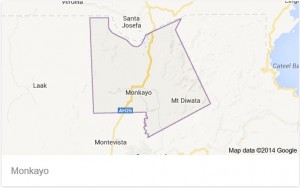Group introduces mercury-free gold ore processing

Evelyn Cubelo, program manager of the BAN Toxic’s artisanal and small-scale gold mining, said the new facility, which makes use of Borax and gravity, would demonstrate a cheaper and more environment-friendly alternative to mercury, still commonly used in gold processing among small-scale miners in Diwalwal.
Borax and gavity, she said, have long been in use in traditional mining areas in Benguet and Mountain Province.
Borax is a common industrial and household cleaning compound. It is also known as sodium borate, sodium tetraborate, or disodium tetraborate (Na2B4O7-10H2O). It is solid white in appearance and melts at about 743 degrees Celsius. However, Borax is not acutely toxic.
Mercury on the other hand is a rare element that was first used to extract gold from ore during the American gold rush. It is highly toxic.
Mt. Diwata, which holds one of the country’s largest gold deposits, contributing P2 billion worth of gold every year according to Bangko Sentral ng Pilipinas estimates, is known for its rampant use of mercury.
“At the moment, it’s very urgent that we have to end the use of mercury in gold processing because of the danger it poses to health and the environment,” Cubelo said.
She said that Borax, if handled properly, is less toxic than mercury and easily disintegrates and dissipates into the air.
“It is still the best alternative technology that we have now, while we continue to look for better technology that will not threaten people’s health and will not pollute the environment,” Cubelo said.
Of the estimated 18,000 mining population in Diwalwal, the group targets to convert 5,000 small-scale miners to the alternative method by training them directly or indirectly to use the new facility.
BAN Toxics said it is currently working with the Federation of Small-scale Miners on Mt. Diwata to push the use of Borax in gold processing there.
“Considering that mercury costs some P8,000 per kilo, borax, which only costs P100 per kilo, will be a much cheaper alternative,” Cubelo said.
“We believe the small-scale miners of Mount Diwata are willing to change if they’re given the chance and the choice,” said Richard Gutierrez, BAN Toxics executive director. “The facility we are putting up will give them the alternative they need to let go of mercury.”
Over 200 artisanal and small-scale miners in Diwalwal attended the recent launching of the facility.
BAN Toxics said it would bring bring in trainers from other parts of the country, among them miners who have abandoned mercury use, to educate and train the small-scale miners of Mount Diwata on how to use the mercury-free technique in gold extraction.
Mercury use in small-scale mining was banned by Executive Order 79 in 2012. Although illegal, mercury can still be bought in the unregulated market.
A study made by the United Nations Environment Program said that artisanal and small-scale gold mining were the single largest mercury-emitting sector in the world. The Environment Management Bureau of the Department of Environment and Natural Resources estimates the annual mercury discharge in the Philippines at around 70 metric tons.
“We have witnessed many stories of the transformation of miners who stopped using mercury in gold mining through the help of BAN Toxics. We don’t want to be witnesses anymore,” said Pedro Samillano, barangay captain of Mt. Diwata. “We want to take part in this change.”